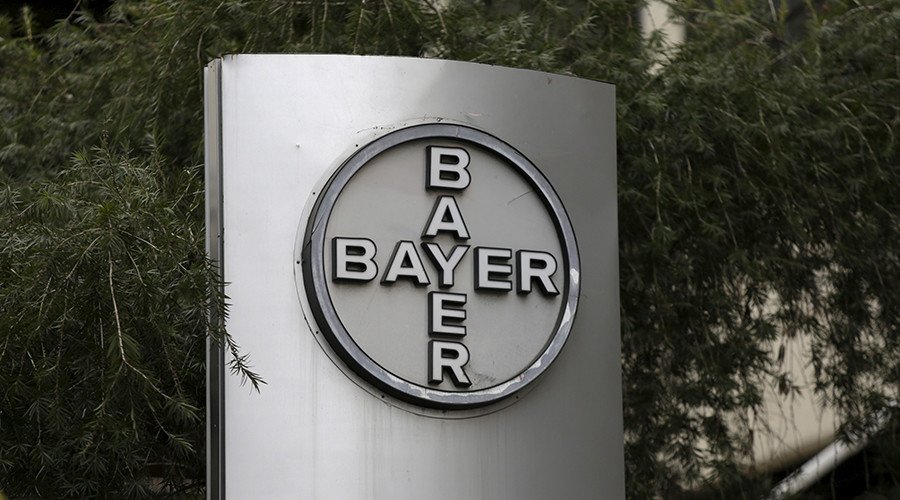Thousands march against GMO giant Monsanto as Bayer takeover looms (PHOTOS, VIDEO)
More than 400 simultaneous demonstrations around the world are voicing fury at US biotech leviathan Monsanto, which is facing a hostile takeover from German pharmaceuticals company Bayer.
March against Monsanto: Global protests LIVE UPDATES
“The whole world hates Monsanto!” read the banners among a throng in Paris, marching to the sound of a drum band.
#Tomorrowlandhttps://t.co/wPLLCrfz55 RT JuanMazaCalleja: Paris: People gathering to protest against #Monsanto, #… pic.twitter.com/O3rpXXvJoL
— Occupycentre Debout! (@Occupycentre) May 21, 2016
The crowd held up posters condemning the sale of the herbicide RoundUp, which has been accused of causing cancer in humans, and the development of genetically-modified crops.
#OMPSGhttps://t.co/L3cRGLOY4o Incroyable mobilisation marche contre #Monsanto et la transparence alimentaire Éti… pic.twitter.com/v9gJOqavNB
— Occupycentre Debout! (@Occupycentre) May 21, 2016
Environmentalist and leftist politicians, such as former presidential candidate Jean-Luc Melenchon, marched at the front of the column, but the impetus for the rallies was provided by another group.
Non aux pesticides dans nos vies ! #Melenchonpic.twitter.com/cE5iK0etnV
— gabriel Amard (@gabrielamard) May 21, 2016
The grassroots Nuit Debout has mobilized hundreds of thousands for labor reform protests in recent months, and many of the same demonstrators turned out to barrack the St. Louis-based giant in Lyon, Bordeaux and Lille.
#Monsanto coupable d'écocide, tous debout contre les empoisonneurs! #NuitDeboutpic.twitter.com/30QTGvMHC6
— Nuit Debout Paris (@nuitdeboutparis) May 21, 2016
La mobilisation pour dire #NON à #Monsanto se poursuit. Arrêt devant l'hôtel de ville de #Lyon pour prises de parole pic.twitter.com/lfArdgReEs
— Marc BOUCHAGE (@marcbouchage) May 21, 2016
Genetically-modified crops are banned in France, despite the European Union gradually loosening regulation on the varieties, as they become more popular across the world due to higher yields and greater disease resistance.
Sitting contre #monsanto a #parispic.twitter.com/3HzFmoYJjx
— Louis RT France (@Louis_RTfr) May 21, 2016
Glyphosate, the active chemical in RoundUp and other leading herbicides, could face a Europe-wide ban, after an EU committee failed to issue it with a new retail license, following protracted negotiations. A UN report published this month stated that it was not likely to be ingested in quantities sufficient to cause cancer in humans, but last year’s report by the UN cancer agency called for it to be recognized as a carcinogen that could cause non-Hogdkin’s lymphoma.
Monsanto March meeting at Union Square Park South today at 1 o'clock NYC pic.twitter.com/c3Y0prlrHN
— Time's Up! (@nyctimesup) May 21, 2016
“Monsanto is killing me & you!” and “I am not your experiment!” read placards at a protest march through New York.
More than 90 percent of US-grown corn, soybean and cotton is genetically-modified.
RT`s correspondent Caleb Maupin talked to some of the hundreds of activists gathered in the center of Manhattan to protest against Monsanto. People marched through the streets chanting, “No more Monsanto” and “Monsanto has got to go.” The demonstrators carried signs saying: “Ban glyphosate,” the herbicide which is suspected of causing cancer, and “Stop Monsanto.”
“I think it`s very corrupt and they have too much power over our government,” one of the rally`s participants told Maupin, referring to the biotech giant`s outreach.
“I`m tired of being lied to about what is in my food. We are getting sick, there`s cancer, there`re kids that are being affected, so we want to put a stop to that,” said another activist.
The safety of glyphosate, which is an active ingredient in Monsanto`s herbicide Roundup, has been doubted by many environmental organizations, including Greenpeace.
“If I were Monsanto right now, maybe a Monsanto executive gonna hear this, I would be worried. I would than change my life and come over to the right side of history. Amen,” another protester said.
Well-attended rallies also took place in Tokyo, across Germany and in Canada.
Monsanto, which has repeatedly put out publicity campaigns to try and demonstrate that its product range is safe, issued a conciliatory statement to the protesters.
“The 22,000 people of Monsanto are committed to having an open dialogue about food and agriculture – we’re proud of the work we do, and we’re eager for people to know more about us,” said a Monsanto text sent out to the media. “We know people have different points of view on these topics, and it’s important that they’re able to express and share them.”
Marches against Monsanto have become a regular event over the past half-decade, but activists may soon need to find a new target for their anger, following Bayer’s proposed bid for the US company, which has a market cap of nearly $46 billion.

While there is speculation that the Leverkusen-headquartered company, famous for patenting aspirin, lacks the financial might necessary for a takeover, market analysts have repeatedly suggested that if the bid goes through, Bayer will drop the increasingly toxic Monsanto brand, as it swallows up the company.












